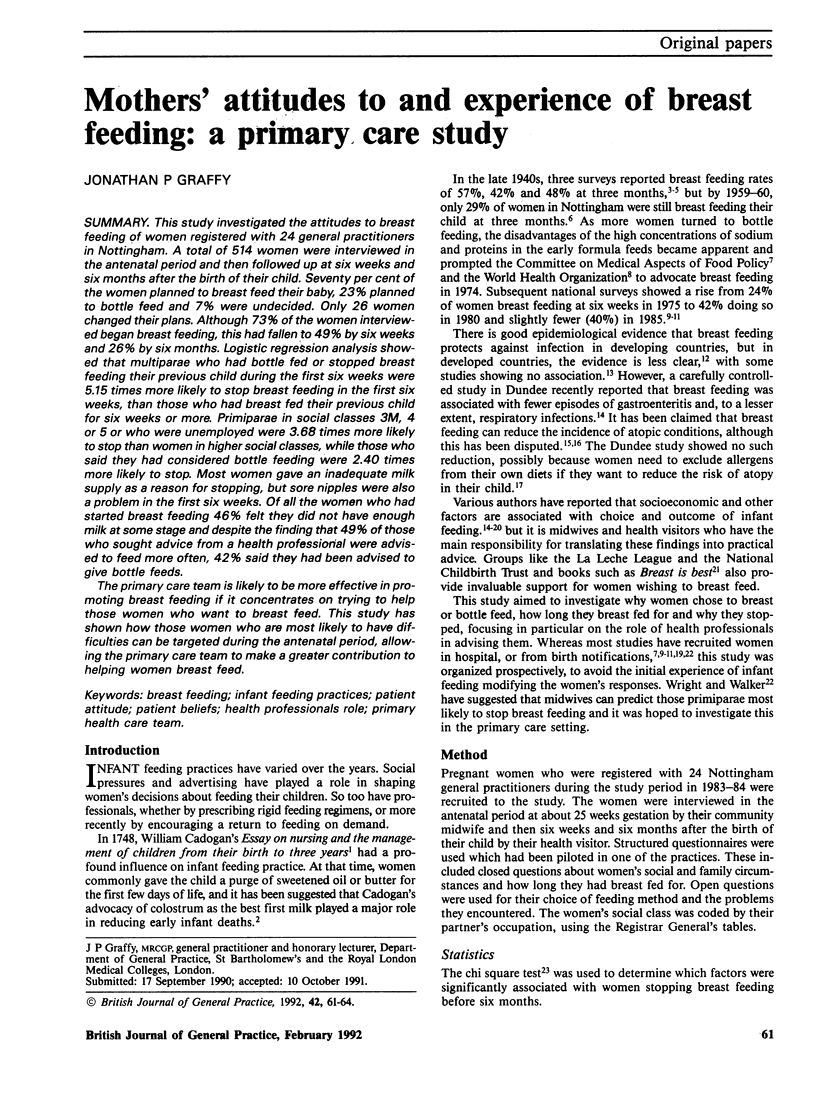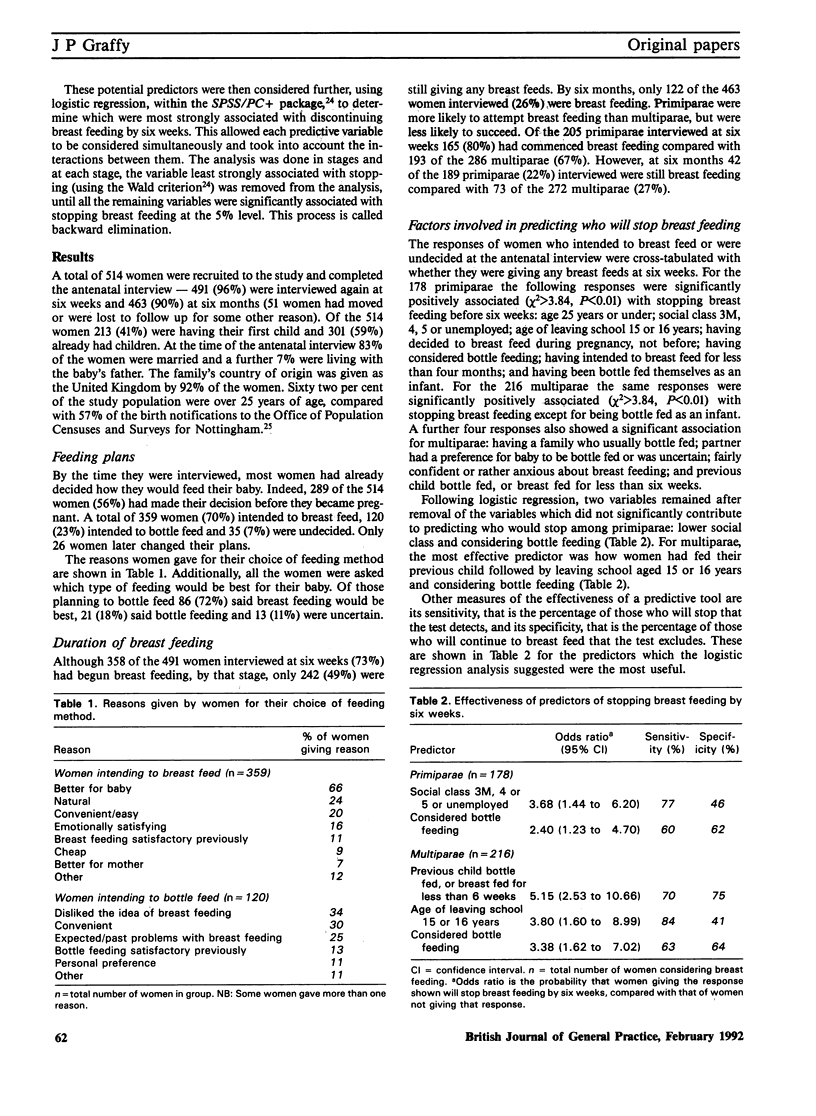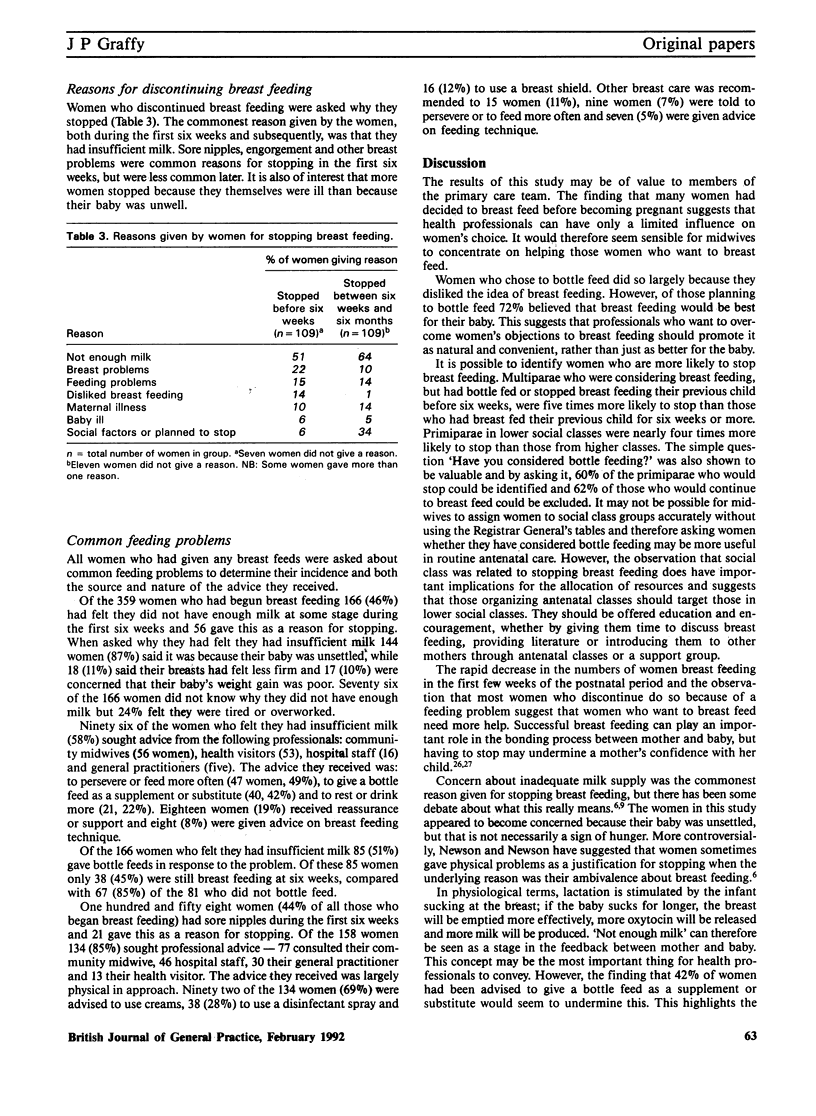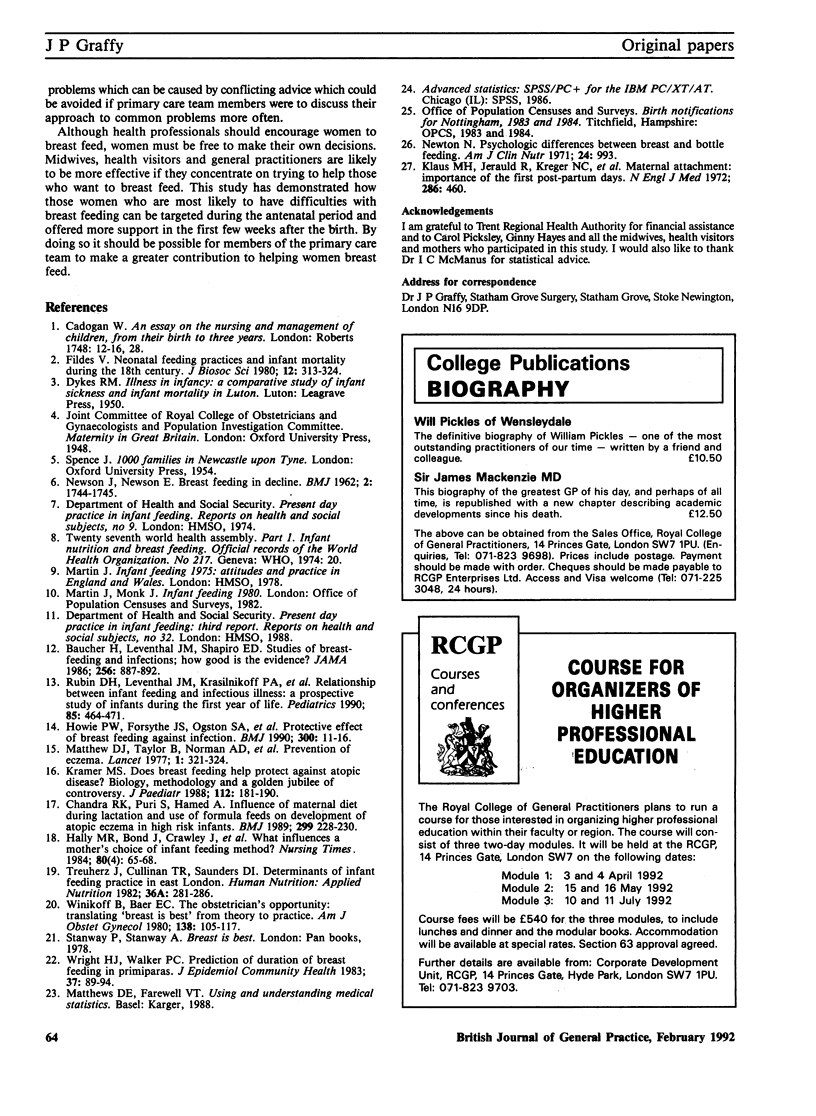Abstract
This study investigated the attitudes to breast feeding of women registered with 24 general practitioners in Nottingham. A total of 514 women were interviewed in the antenatal period and then followed up at six weeks and six months after the birth of their child. Seventy per cent of the women planned to breast feed their baby, 23% planned to bottle feed and 7% were undecided. Only 26 women changed their plans. Although 73% of the women interviewed began breast feeding, this had fallen to 49% by six weeks and 26% by six months. Logistic regression analysis showed that multiparae who had bottle fed or stopped breast feeding their previous child during the first six weeks were 5.15 times more likely to stop breast feeding in the first six weeks, than those who had breast fed their previous child for six weeks or more. Primiparae in social classes 3M, 4 or 5 or who were unemployed were 3.68 times more likely to stop than women in higher social classes, while those who said they had considered bottle feeding were 2.40 times more likely to stop. Most women gave an inadequate milk supply as a reason for stopping, but sore nipples were also a problem in the first six weeks. Of all the women who had started breast feeding 46% felt they did not have enough milk at some stage and despite the finding that 49% of those who sought advice from a health professional were advised to feed more often, 42% said they had been advised to give bottle feeds.(ABSTRACT TRUNCATED AT 250 WORDS)
Full text
PDF



Selected References
These references are in PubMed. This may not be the complete list of references from this article.
- Bauchner H., Leventhal J. M., Shapiro E. D. Studies of breast-feeding and infections. How good is the evidence? JAMA. 1986 Aug 15;256(7):887–892. [PubMed] [Google Scholar]
- Chandra R. K., Puri S., Hamed A. Influence of maternal diet during lactation and use of formula feeds on development of atopic eczema in high risk infants. BMJ. 1989 Jul 22;299(6693):228–230. doi: 10.1136/bmj.299.6693.228. [DOI] [PMC free article] [PubMed] [Google Scholar] [Retracted]
- Fildes V. Neonatal feeding practices and infant mortality during the 18th century. J Biosoc Sci. 1980 Jul;12(3):313–324. doi: 10.1017/s0021932000012852. [DOI] [PubMed] [Google Scholar]
- Hally M. R., Bond J., Crawley J., Gregson B., Philips P., Russell I. What influences a mother's choice of infant feeding method? Nurs Times. 1984 Jan 25;80(4):65–68. [PubMed] [Google Scholar]
- Howie P. W., Forsyth J. S., Ogston S. A., Clark A., Florey C. D. Protective effect of breast feeding against infection. BMJ. 1990 Jan 6;300(6716):11–16. doi: 10.1136/bmj.300.6716.11. [DOI] [PMC free article] [PubMed] [Google Scholar]
- Klaus M. H., Jerauld R., Kreger N. C., McAlpine W., Steffa M., Kennel J. H. Maternal attachment. Importance of the first post-partum days. N Engl J Med. 1972 Mar 2;286(9):460–463. doi: 10.1056/NEJM197203022860904. [DOI] [PubMed] [Google Scholar]
- Kramer M. S. Does breast feeding help protect against atopic disease? Biology, methodology, and a golden jubilee of controversy. J Pediatr. 1988 Feb;112(2):181–190. doi: 10.1016/s0022-3476(88)80054-4. [DOI] [PubMed] [Google Scholar]
- Matthew D. J., Taylor B., Norman A. P., Turner M. W. Prevention of eczema. Lancet. 1977 Feb 12;1(8007):321–324. doi: 10.1016/s0140-6736(77)91131-x. [DOI] [PubMed] [Google Scholar]
- Newton N. The uniqueness of human milk. Psychological differences between breast and bottle feeding. Am J Clin Nutr. 1971 Aug;24(8):993–1004. doi: 10.1093/ajcn/24.8.993. [DOI] [PubMed] [Google Scholar]
- Rubin D. H., Leventhal J. M., Krasilnikoff P. A., Kuo H. S., Jekel J. F., Weile B., Levee A., Kurzon M., Berget A. Relationship between infant feeding and infectious illness: a prospective study of infants during the first year of life. Pediatrics. 1990 Apr;85(4):464–471. [PubMed] [Google Scholar]
- Treuherz J., Cullinan T. R., Saunders D. I. Determinants of infant-feeding practice in East London. Hum Nutr Appl Nutr. 1982 Aug;36A(4):281–286. [PubMed] [Google Scholar]
- Winikoff B., Baer E. C. The obstetrician's opportunity: translating "breast is best" from theory to practice. Am J Obstet Gynecol. 1980 Sep 1;138(1):105–117. doi: 10.1016/0002-9378(80)90018-6. [DOI] [PubMed] [Google Scholar]
- Wright H. J., Walker P. C. Prediction of duration of breast feeding in primiparas. J Epidemiol Community Health. 1983 Jun;37(2):89–94. doi: 10.1136/jech.37.2.89. [DOI] [PMC free article] [PubMed] [Google Scholar]



